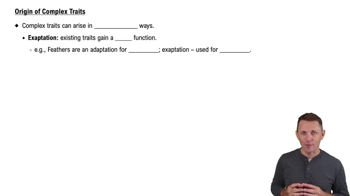Here are the essential concepts you must grasp in order to answer the question correctly.
Quantitative Traits
Quantitative traits are characteristics that vary in degree and can be measured on a continuous scale, such as height or weight. Unlike qualitative traits, which are categorical, quantitative traits are influenced by multiple genes (polygenic inheritance) and environmental factors, leading to a range of phenotypes within a population.
Recommended video:
Genetic Variation
Genetic variation refers to the diversity in gene frequencies among individuals within a population. This variation is crucial for evolution and can arise from mutations, gene flow, and sexual reproduction, contributing to the differences observed in quantitative traits as different alleles interact to produce a range of phenotypic outcomes.
Recommended video:
Sources of Genetic Variation
Environmental Influences
Environmental influences encompass the external factors that affect the expression of traits in organisms, such as climate, nutrition, and habitat. These factors can interact with genetic predispositions to produce variations in traits, demonstrating that both genetics and environment play significant roles in shaping quantitative variation within populations.
Recommended video:
Environmental Tonicity Affects Cells
 Verified step by step guidance
Verified step by step guidance


